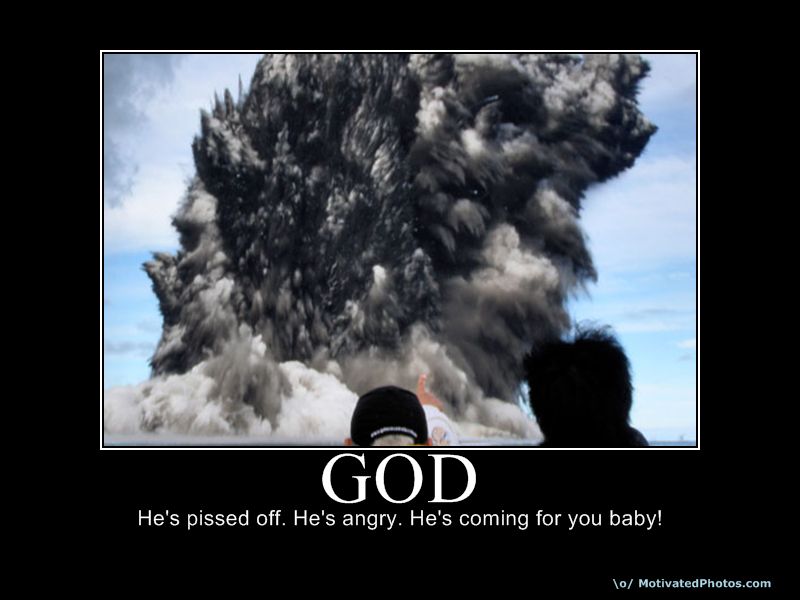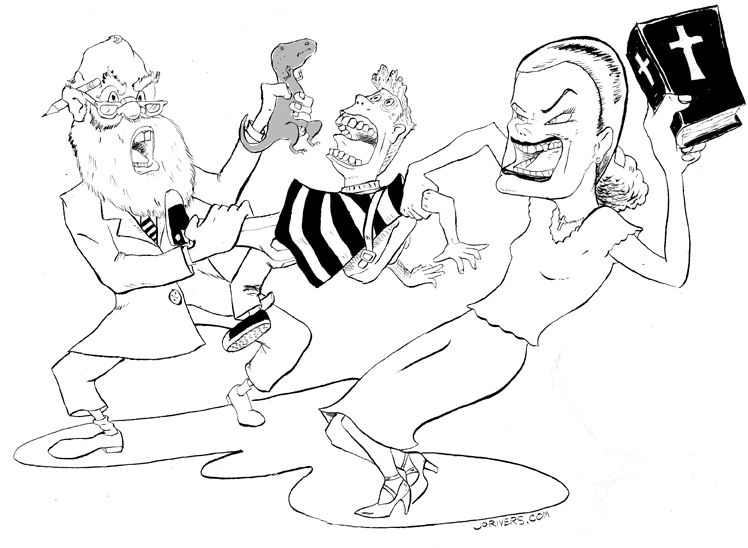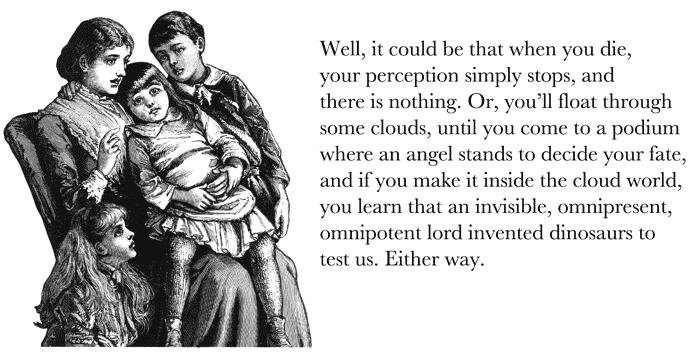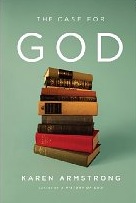For, And Against, The Case For God
Karen Armstrong provides an accessible history and a compelling if flawed analysis of the uneasy state of science/religion in the West.
By Michael Sigman‘He who possesses art and science has religion; he who does not possess them, needs religion.’
—GoetheKeeping track of the religion vs. science industry—the studies, the books, the blogs, the papers, the TV and radio series—is enough to make you crave the silence of a monastery. Rebecca Goldstein's new satirical novel, 36 Arguments for the Existence of God, and Barbara Herrnstein Smith's weighty tome, Natural Reflections: Human Cognition at the Nexus of Science and Religion, are just the latest additions to my must-at-least-peruse list.
So it's tempting to thank the Lord—or trillions of random sub-atomic particles—for Karen Armstrong's ambitious The Case for God, which provides an accessible history and a compelling if flawed analysis of the uneasy state of science/religion in the West.
An erstwhile Catholic nun who's written and spoken widely on religious subjects (The History of God, Islam, a Short History, et al.), Armstrong is best known for promoting her view that all the great religions share the same basic themes of compassion as exemplified by the Golden Rule.
The Case for God laments the unbridgeable chasm that prevails today between fundamentalists and positivists obscures a meaningful exploration of the relationship between mystery (mythos) and rationality (logos). On one extreme, tens of millions of evangelicals—led by the likes of Jim Dobson and Pat Robertson—insist on a literal interpretation of the Bible, seeing God as a fearful, all-powerful being, thereby cutting spiritual experience off from its true meaning. On the flip side, thinkers like scientist Richard Dawkins (The God Gene, et al.) and culture critic Christopher Hitchens (God is Not Great) throw out the bathwater of fundamentalism with the baby of authentic religion. By heaping scorn on all spiritual experience because Biblical literalism flies in the face of science, they dismiss the real-world experience of the great majority of humans who've ever inhabited the planet.
In a stunning first chapter, Armstrong takes us back to the old days—the very old days, some seventeen thousand years ago—when human consciousness was magical and religion was inseparable from the human experience. For Stone Age cave dwellers, "there is no concept of the supernatural, no huge gulf separating the human and the divine....In the pre-modern world, ritual was not the product of religious ideas; on the contrary, these ideas were the product of ritual." There were no distinctions between spirituality and reason, or between religion and art—the sacred inhabited every being, inextricably interwoven into each lived moment. Gods didn't exist as supreme, independent beings, and it would have been unthinkable for there to have been atheists to oppose them.
Fast forward to some three thousand years ago, when philosophers in the Greek colony of Miletus had a radically different experience of the world. Armstrong: "Despite the flux and change that were apparent everywhere in the universe, they were convinced that there was an underlying order and that the universe was governed by intelligible laws. They believed that there was an explanation for everything and that stringent rational inquiry would enable them to find it. These Ionian naturalists had launched the Western scientific tradition."
Before launching into the overview of Western religion that comprises most of her book, Armstrong reminds us that the apophasic religion of the ancients—practice, not theory—has dominated in the East all along, with Hinduism, Buddhism, Daoism and Confucianism all acknowledging the ineffability of articulating the sacred while emphasizing the spiritual rewards of consistent, silent practices like yoga and meditation. The Buddha told his disciples that theological speculations "will not help you, they are not useful in the quest for holiness," and Confucius prescribed compassion "all day and every day" and "preferred to remain silent about what lay at the end of the religious journey."
Armstrong then devotes the great bulk of the book to a historical survey of religion vs. science in the West. It's a fine brush-up for us non-academics, but doesn't add much to what you could find out via a few hours with Google.
She begins with the ancient Greek founders of Western philosophy, and here her analysis suffers from the reductionism for which she rightly criticizes fundamentalists and materialists. She forces a connection between the selfless, silent receptivity of the Eastern masters and Socrates, who preferred verbal dialogues with his followers to writing anything down, lest his wisdom become ossified: "To his dying day, Socrates insisted that he had no interest in teaching anybody anything because he knew nothing at all."
Perhaps they don't teach Socratic irony in the convent, but Socrates' clever disavowals of knowledge weren't to be taken any more literally than the story of Adam and Eve. His star student, Plato, wrote down much of what his teacher said and—layering on his profoudly metaphysical beliefs that ideas were the progenitors of the material world—immortalized Socratic wisdom in his Dialogues. He was followed by Aristotle, who spent his life chronicling and writing down everything. Yet Armstrong conveniently concludes that Socrates, Plato and Aristotle all "saw theory as secondary to and dependent on practice."
Armstrong moves on to the march of monotheism, which "tore the universe from God" and led to centuries of astonishing progress and violent conflict, glorious freedom and unspeakable suppression.
Darwin's nineteenth century discoveries about evolution and natural selection revealed a messy, bloody universe far from Western Christendom's idea of an intelligent, ordered creator. All that was needed to complete the separation of theology from religion was Nietzsche's declaration that rationalists had effectively killed the Christian god.For Armstrong, modernism—the Reformation, Renaissance, scientific revolution and The Enlightenment—emphasized the increasing reliance on God as an external force requiring philosophical proof (Aquinas) or scientific proof (Newton), taking people farther and farther from a direct connection with authentic spirituality. After the scientific breakthroughs of Copernicus, Kepler, Galileo and Newton, there was hardly a need for prayer, ritual, or any kind of religious practice. Math and science were sufficient to explicate a supreme, perfectly rational God.
Darwin's nineteenth century discoveries about evolution and natural selection revealed a messy, bloody universe far from Western Christendom's idea of an intelligent, ordered creator. All that was needed to complete the separation of theology from religion was Nietzsche's declaration that rationalists had effectively killed the Christian god.
When she arrives at the twentieth century, Armstrong dismisses Sigmund Freud—a thinker whose profundity and import can't be overestimated—as just another atheist, in this case one who characterized all spiritual experience as neurotic. Freud did believe that religious experiences reflected psychological dynamics like narcissism and attachment to the mother. But, as Freud scholar and psychoanalyst Dr. James Fisher told me, "Later in life, Freud argued in 'Moses and Monotheism' that religion provided an important historical function as humanity developed, namely it grounded human beings with an ethical set of beliefs. He always appreciated and very much valued the world of art, literature, philosophy, areas of culture that belonged to the spiritual realm. In that sense he valued the spiritual while opposing all religions that obfuscated consciousness and spiritual practices that mystified."
The dominant scientific development of the twentieth century—the quantum revolution, with its Alice in Wonderland findings that time is relative and that a particle can be in two places at once—revealed that the universe, at its deepest level, is irrational and defies logical explanation. For many post-modern thinkers, these findings lead to only one conclusion: In the words of Italian philosopher Gianni Vattimo, "There are no absolute truths anymore—only interpretations."
"The Case for God" ends with Armstrong's heartfelt hope that the chaos suggested by quantum randomness will produce "a new kind of apophasic theology. By this I do not mean fervid emotional piety. Instead of seeking out exotic raptures...we should explore the normal working of our minds and notice how frequently these propel us quite naturally into transcendence. Instead of looking outside ourselves, we should, like Augustine, turn within and become aware of the way quite ordinary responses segue into 'otherness.'"
It's hard for me to argue with this, having experienced the benefits of the regular practice of Buddhist meditation for more than a decade. Quiet, receptive spiritual practice—especially when you're part of a community of practitioners—can put you in touch with a force larger than yourself and promote compassion. I hope the book encourages and inspires others to try the myriad spiritual options now available in most cities and towns, and, yes, online. But because what Armstrong advocates is so general, it may not have much impact beyond reinforcing the ideas of those already inclined to agree with her.
And she has her work cut out for her. The 2009 American Religious Identification Survey found the number of those claiming "no religion" has doubled over the past two decades, to 15 percent. She's certainly not swaying The Guardian's secularist Simon Blackburn, who challenges the notion that transcendent experience has anything to do with God: "Imagine that I come out of the art gallery or other trance with a beatific smile on my face. I have enjoyed myself, and feel better. Perhaps I give a coin to the beggar I ignored on the way in. Even if I do so, there is no reason to describe the improvement in terms of my having understood anything. As Wittgenstein, whose views on religion Armstrong thoroughly endorses, also said, an inner process stands in need of outward criteria. You can feel good without being good, and be good without stretching your understanding beyond words."
And from the religious flank, New York Times columnist Ross Douthat argues that it's too easy to let Biblical "truths" off the hook by not taking them literally: "The Case for God argues, convincingly, that (scientific rationality) needs to coexist with more mythic, mystic and philosophical forms of faith. Most people, though, are not mystics and philosophers, and they are hungry for myths that are not only resonant but true." (Italics mine.)
There's no reason you can't support Armstrong's emphasis on practice yet still be fascinated by theoretical explorations of why there's something rather than nothing. I wish Armstrong had made room for the brilliant thinking of contemporary non-traditionalists like Ken Wilber (Sex, Ecology and Spirituality)—who sees old-time religion as an important stage in the development of human consciousness, essential to the development of later stages—and Dean Radin, whose The Conscious Universe explores how the scientific revolution's separating of spirit from matter has caused science to "lose its mind."
For better or worse, the metaphysical toothpaste can't be put back in the tube, and we're left with the mind-blowing paradoxes and mysteries that Zen masters have grappled with for millennia. If, as Armstrong argues, religious experience is truly beyond words, how come she's dedicated years to researching, writing and talking about it?
One might well ask, "What's the sound of Karen Armstrong's right brain wrestling with her left brain?"
Writer/editor, media consultant, music publisher Michael Sigman is a regular Huffington Post blogger in the site’s Entertainment section.
Founder/Publisher/Editor: David McGee
Contributing Editors: Billy Altman, Laura Fissinger, Christopher Hill, Derk Richardson
Logo Design: John Mendelsohn (www.johnmendelsohn.com)
Website Design: Kieran McGee (www.kieranmcgee.com)
Staff Photographers: Audrey Harrod (Louisville, KY; www.flickr.com/audreyharrod), Alicia Zappier (New York)
E-mail: thebluegrassspecial@gmail.com
Mailing Address: David McGee, 201 W. 85 St.—5B, New York, NY 10024






